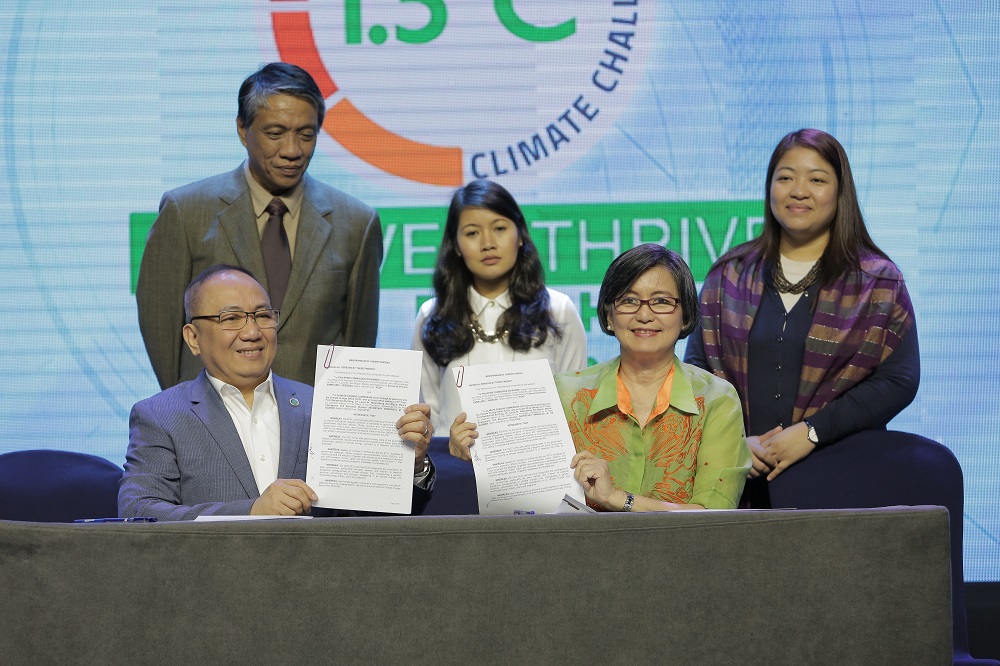
December 08, 2020 Tuesday

MANILA, 9 December 2020 — A discussion by government and civil society on the nexus of climate change, health, and gender towards transitioning to a better normal formed part of the 13th Global Warming and Climate Change Consciousness Week with the theme "Adapting For A Sustainable Future."
The “Climate Change and Health: A Gender Lens”, an online dialogue organized by the Climate Change Commission, in partnership with the Institute for Climate and Sustainable Cities and the Asian-Pacific Resource and Research Centre for Women’s (ARROW) Women and Earth Initiative (WORTH) was streamed via Zoom and Facebook Live last November 24.
“We have various studies all over the world and here in the Philippines that point out that women are disproportionately impacted by the climate crisis, and that women have increased exposure to risks from the threats of climate impacts. Let us acknowledge and highlight the insights and experiences and roles of women to further drive climate ambition and action in our country and in the world,” CCC Commissioner Rachel Herrera said in her opening remarks.
Director Anna Liza Bonagua of the Department of Interior and Local Government-Bureau of Local Government Development presented the subnational efforts to mainstream climate change in local development plans and what are the existing policies plans regarding climate change planning.
“There are steps that we are advocating mainstream climate into the development planning process. First, the organization of the planning committee that will become a champion in the integration of climate into the entire planning process for the LGUs. Second, gathering of the information requirements that will be included in the ecological profile. This should be climate-specific information such as maps, projections, and historical records. The third is the current and future climate risk assessment and vulnerability analysis, corresponding to the vulnerability of the locality, and development of options to adapt and enable climate-resilient development. These are the identification of the programs, projects, and activities that the LGUs should include in their comprehensive development plans, as well as in their investment program. The next one is ensuring the financing of DRR and CCA measures. A plan without a budget is just a plan. And then the implementation, monitoring and evaluation.” Dir. Bonagua said.
Dr. Glenn Roy Paraso, member of the CCC’s National Panel of Technical Experts and Executive Director of the Mary Johnston Hospital, highlighted the gender-differentiated impacts of climate change and health crises.
“Health, per se is neutral, however, culture’s gender norms and values give rise to gender differences. Both gender differences and gender inequality can give rise to inequities between men and women in health status and access to health care. What we do in the Mary Johnston Hospital, we launched a Mission Continuity Plan and part of that was to provide access to access to transportation to and from a pick-up point, because the majority of our personnel in the hospital are female. Another example is we provided housing for them within the hospital. These are some examples of how we are looking to implement more gender-sensitive measures for our personnel,” Dr. Paraso said.
Following the panel discussions, breakout sessions focused on national and local policy development, identifying frameworks and analysis of support to planning, and cross-cutting issues across topics to incorporate gender as the main criterion for resilience building. Specifically, the breakout sessions identified the challenges faced in integrating gender and development in climate change; key elements in relation to input, process and output of gender, health, and climate analysis; and how to approach the discussion on the gender and climate nexus during the present pandemic.
With the COVID-19 pandemic, the onslaught of extreme weather events, and the creeping impacts of slow-onset events such as sea level rise and increasing temperature, various gender issues have emerged - some visible, while some left in the shadows, but both needing closer analysis and due consideration.
The event created a platform for stakeholder dialogue to surface the interlinkages of climate, health, and gender towards developing a joint agenda for government and civil society to develop gender and health-responsive climate change and development action, plans and policies toward a better normal.
Watch the replay of The Climate Change and Health: A Gender Lens through this link: https://web.facebook.